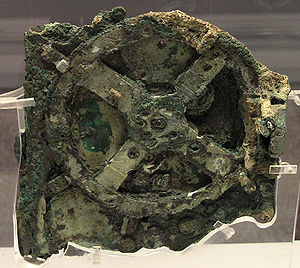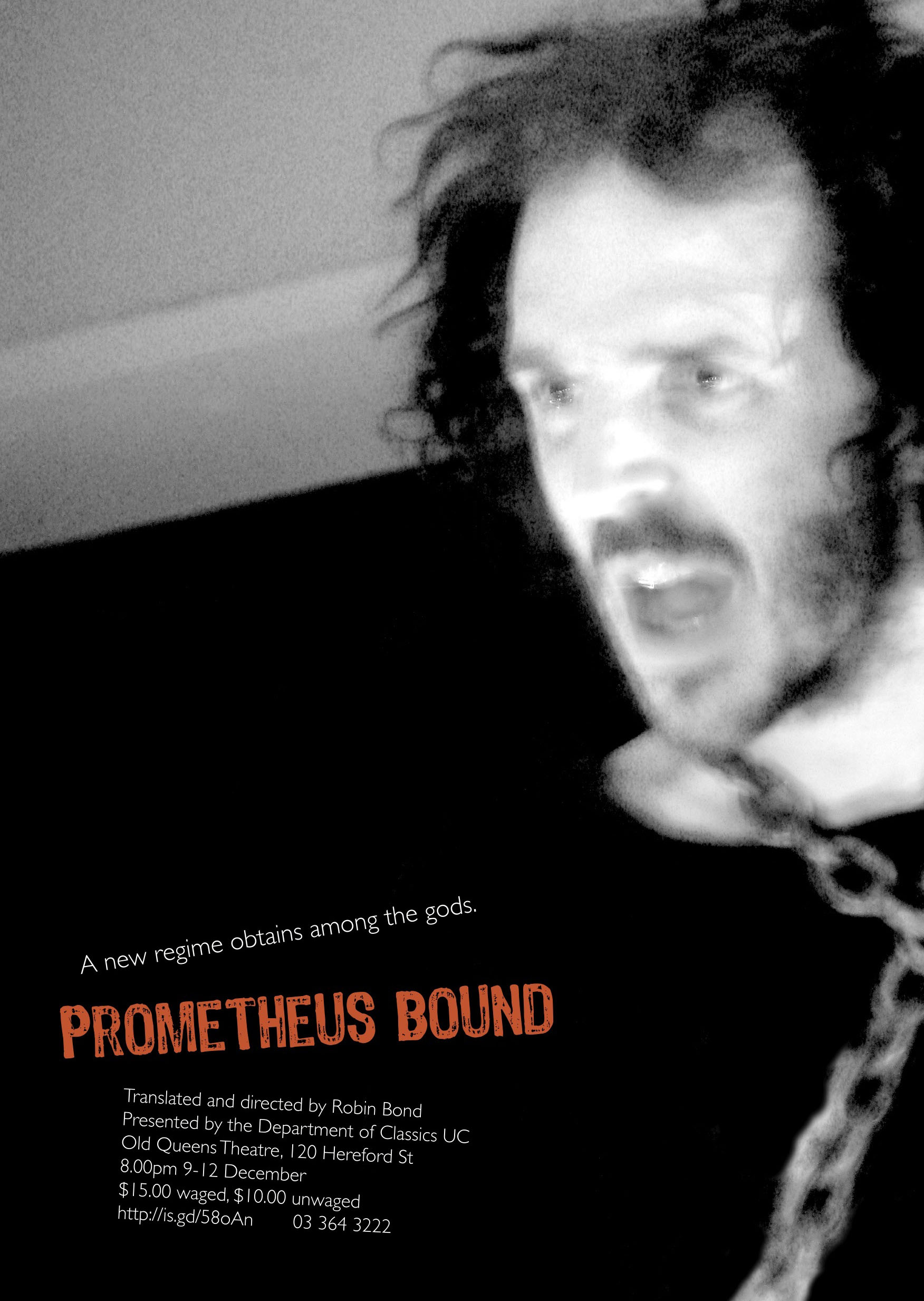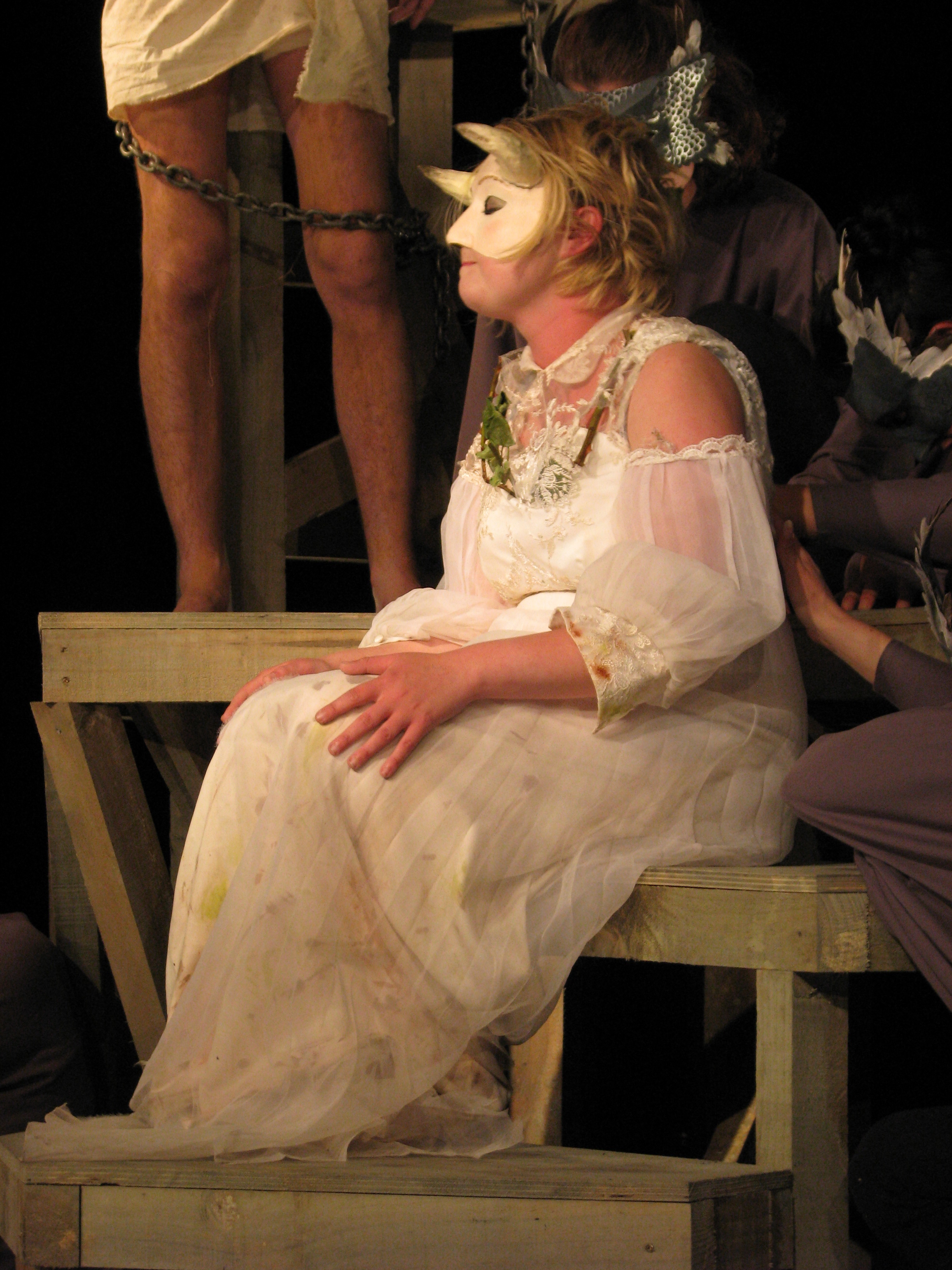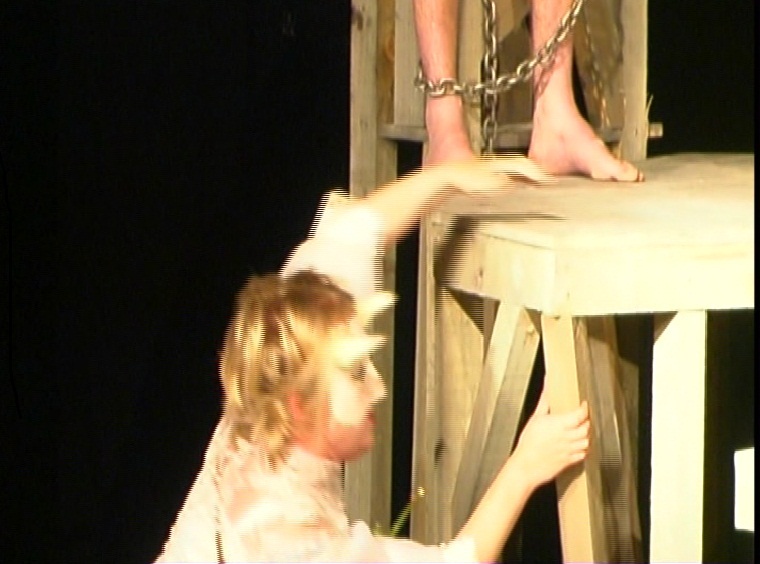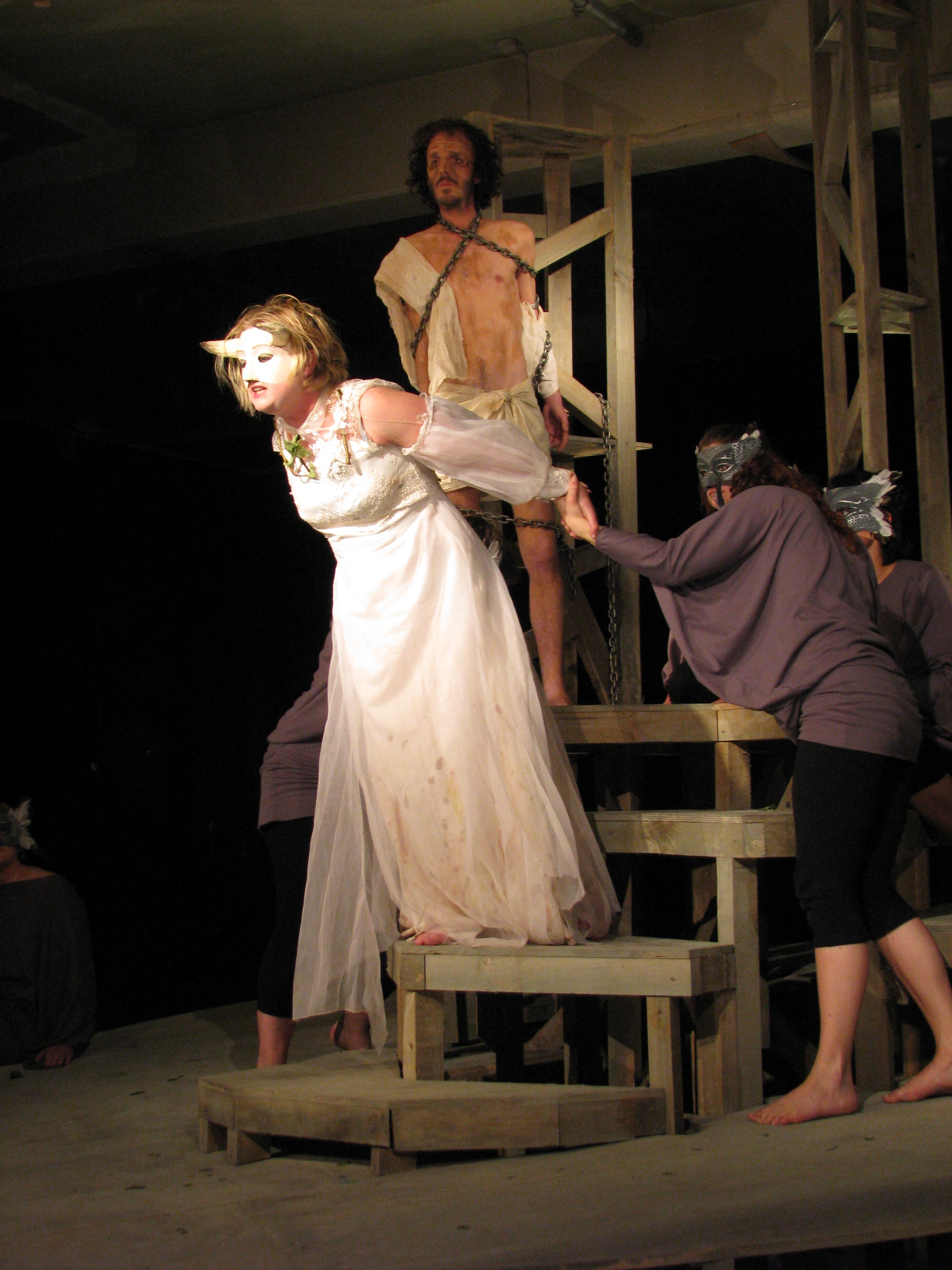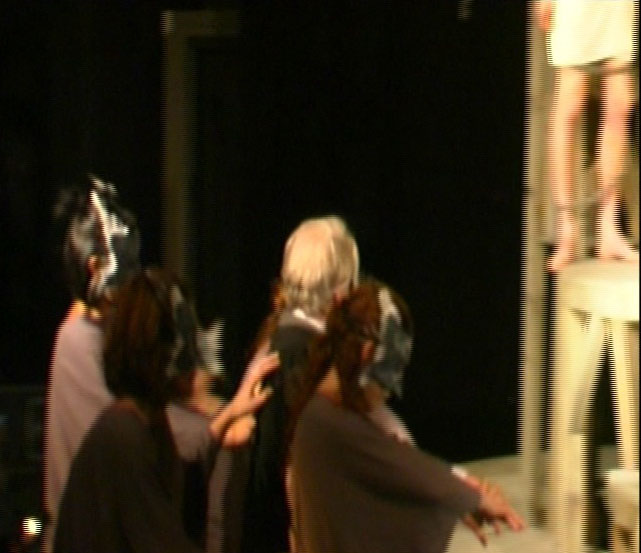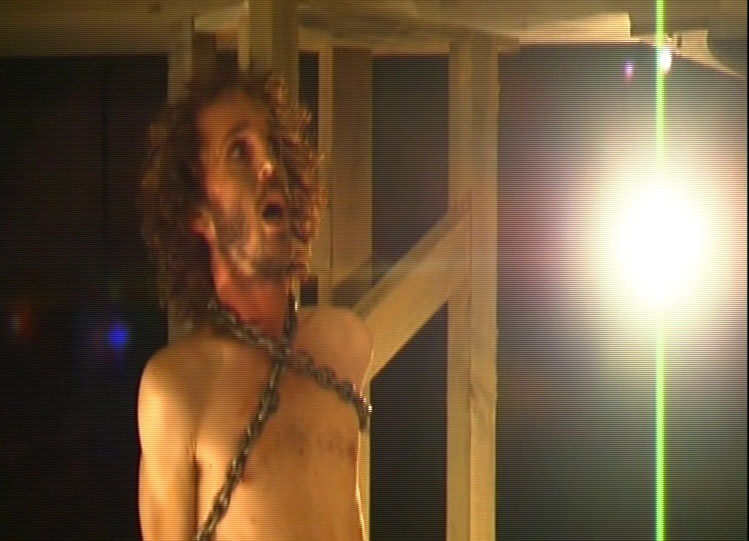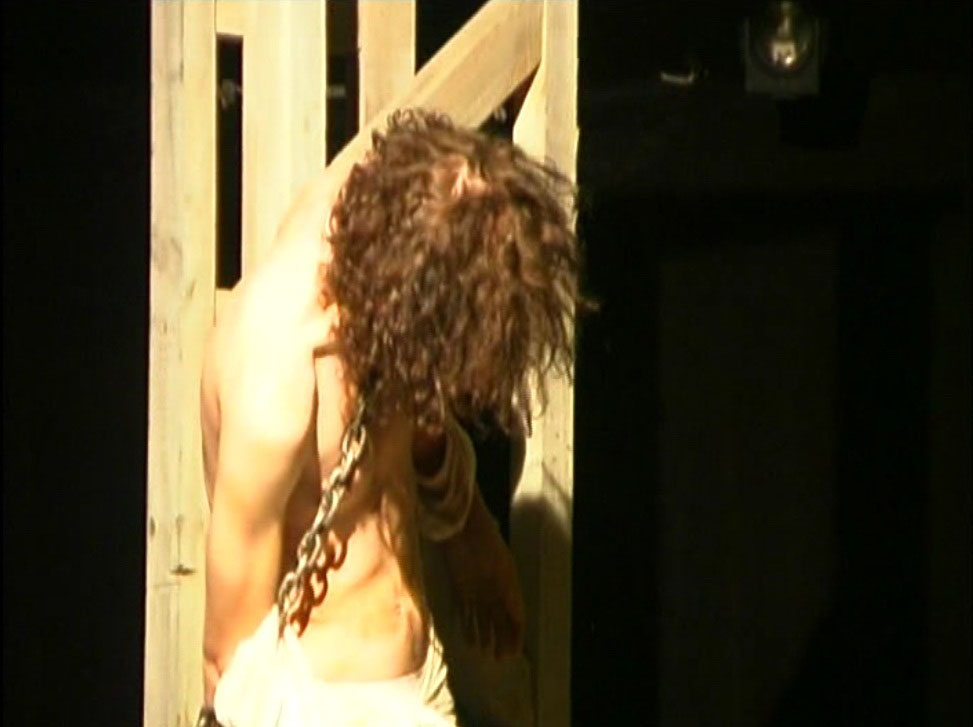The Figure of Prometheus and the Origins of Civilization
Robin Bond
Introduction
The focus of the studies of the vast majority of classical scholars is on
what might broadly be described as the humanities—the various literary
genres brought to a state of perfection by the ancient Greeks, the epic poetry
of Homer, the tragedies of Aeschylus, Sophocles and Euripides, for example, or
the comedies of Aristophanes and Menander, the historical works of Herodotus
and Thucydides, and, of course the vast philosophical corpus that constitutes
the works of Plato. Also objects of admiration and study are the masterworks
of Greek architecture, sculpture and vase painting. However, it is the aesthetic element that appeals generally to classicists rather than the
sophisticated technologies of stone masonry, lost wax bronze figures and the
ceramicist's skills which produced exquisite black and red figure vase
painting. Classicists neglect the fact that it was a sophisticated technology
which facilitated the artists' self expression in marble or bronze or clay.
However, ancient technology was not merely the servant of the arts, but of ancient Greek civilization and trade in general. This was demonstrated in an exhibition of ancient technology organized by the municipal authorities of Athens and the Technological Museum of Thessaloniki in 2002 and housed appropriately in what had been a gas works in a former incarnation.1 Models were put on display of Hero of Alexandria's hydraulic and mechanical device for automatically opening temple doors and also his steam engine which utilized the pressure of steam to create circular physical motion. Also on display were models of Archimedes' screw, a device for moving and lifting water mechanically, a crane used at the harbour of Amathonte in Crete which utilized winches to lift heavy weights on and off cargo ships. Perhaps most remarkable of all is the reconstruction of the so-called Antikythera mechanism excavated from an ancient shipwreck in the Aegean which was a clockwork device considered to be the first known mechanical calculator and used for astronomical calculations.2
In keeping with traditional practice in the Greek world, major areas of expertise in the fields of art and technology were attributed to divine or mythical figures. The art of medicine was, for example, attributed to Aesculapius, the skills of agriculture to Triptolemus under the instruction of Demeter. However the founding father of all the arts and technologies was the Titan named Prometheus.
The story of Prometheus concerns one of the archetypal mythic figures of the Greek tradition and has many parallels with myths of other cultures. The story of Prometheus is developed both in the poems of Hesiod and in the fifth century tragic drama, Prometheus Bound, attributed by tradition to the Athenian playwright Aeschylus. In the Theogony and the Works and Days of Hesiod the early poet (c. 700 BC) gives a fairly straightforward account of the Prometheus story. One or two inconsistencies suggest more than one source, but the basic narrative is clear enough. The myth as retold by Hesiod raises some fascinating issues and questions regarding early attitudes to the human condition, the nature of the relationship between human beings and gods and, indeed, the vexed nature of the relationship between the sexes. These issues naturally recur in Aeschylus' dramatic treatment, but his dramatic treatment is best understood in terms of the way it is inflected by the political situation in Athens in the fifth century BC and by the Athenian audience's expectations regarding the role and function of tragedy.
The Reader's Encyclopaedia gives a bare outline of the story of Prometheus:
Prometheus (Gr. 'forethought'). In Greek mythology, a son of Iapetus and Themis ... He stole fire from heaven. A champion of man against the gods, he tricked Zeus into choosing fat and bone as the god's portion of sacrifices, leaving the flesh for men. Angrily Zeus withheld fire from men, but Prometheus stole it in a fennel stock. As a punishment Prometheus was nailed to a mountain, where an eagle tore out his liver by day and it grew again by night. Eventually Herakles rescued him, or he was saved by Zeus himself. Man, meanwhile, had been afflicted with innumerable ills through Pandora. According to some stories, Prometheus was the creator of man, moulding him from mud. It is likely that he was a pre-Hellenic fire-god who was replaced by Hephaestus.3
Over time this trickster character has
appeared in many incarnations. In Prometheus Bound he appears as the
prototypical tragic hero, fulfilling the criteria set down for such a
character by Aristotle in the Poetics. In the eighteenth and nineteenth
centuries, during the 'romantic movement', which emphasised the importance of
the imagination and the emotions over reason and intellect as espoused by
Neo-Classicism, he became something of a 'romantic hero'. In this guise he was
exploited by Byron and Shelley, while Mary Shelley's Frankenstein had the
alternative title The Modern Prometheus. More recently he has appeared as a
Marxist hero, a champion of humble humankind in its eternal struggle against
the masters, as in Tony Harrison's film, Prometheus.4
Hesiod's Works and Days and Theogony
However that may be, let's look first at the story in the Theogony and the Works and Days. The latter was a didactic work on farming, directed by Hesiod at a less than energetic brother who was alleged by Hesiod to have cheated him out of some portion of his inheritance, which may have some implications for the presentation in the poem of Prometheus' wastrel brother Epimetheus, (Gr. 'Afterthought'), and his recipient of the deadly gift of Pandora.The story's main characters and incidents are:
a) the (willing) deception of Zeus by Prometheus at the sacrifice at Mecone,
b) the punishment of man through the deprivation of fire,
c) Prometheus' theft of fire and the restoration of it to man,
d) the violent punishment of Prometheus by the young Zeus,
e) the eternal punishment of man by the guileful gift of woman, Pandora, foolishly
accepted by Epimetheus and the gift/curse of hope.
One reading of the events at the sacrifice is straightforward enough, but only partially satisfying, as is indicated by G. S. Kirk:
On this occasion, then, the mythical justification of an apparent contradiction (that the gods are given the worst bits rather than the best) is rather inept; indeed a better defence of the practice could have been made ... yet such a defence might not in the end have been emotionally satisfying. It could easily fail to remove the guilt men felt over keeping the best parts for themselves. Guilt is a cardinal feeling ... Some such feeling demanded that men should be made to pay for the offending practice, and that is where the myth came in.5
In other words the myth attempts to give an answer not only to the paradox presented by the procedures at a sacrifice, but it also raises and provides answers to other and more general and substantial questions:
a) Why does the human condition seem so hard?
b) How can we account for the apparent malevolence of the gods?
c) How is that we mortals, creatures of a day, mere ephemerals, possess fire?
d) Has the influence of fire been totally beneficial and if not why not?
e) Why is the relationship between male and female so fraught with tension?
f) What effect has hope had on the lives of humankind?
Why, then, does human life seems so hard? It is apparently because at some early stage either mankind or mankind's champion mortally offended the supreme ruler of the cosmos. Our hard condition derives from the fact that the gods are constitutionally hostile towards us because we have both usurped the better bits of the sacrifice and, more importantly, stolen that element for our own use, which, naturally speaking, is the prerogative of the gods, especially Zeus, namely fire. The Greek concept of justice is the concept according to which the proper apportionment of a share (Moira) is made in a manner appropriate to an individual's standing and power. Accordingly, the myth gives an account of why we, mere creatures of a day, are actually in possession and master of an element which is essentially divine, which raises us above the level of the other beasts—the stuff of lightening and the thunderbolt and the volcano's fiery blast.6 Fire was gifted to us by a god who was in opposition to the ruling dynasty, a member of an older order, a Titan, whose motive was not, in this version of the story, as reported by Hesiod, so much benevolence to humankind as a desire to annoy Zeus.
In this respect Prometheus has much in common with the folktale figure of the trickster, described in the Larousse Dictionary of World Folklore as follows:
Wily amoral hero ... often regarded as the culture hero of a tribe, who in mythology either created them or taught them their knowledge. In these tales the hero usually overcomes a more powerful adversary by using cunning and deceit, often motivated by nothing more than sheer mischievousness ... a tale will often serve as explanation for a particular belief or custom of the group, and thus justify the society's value system ... i.e. will be a type of charter myth.7
Prometheus is not, indeed, dissimilar to Maui who in Maori folklore and myth also championed men against the gods and stole fire for them from the keeper of the underworld. However, it is the distinctly self aware and developed literary treatments of the Prometheus story that distinguish it from the tales of wily tricksters from African folklore and the stories of the Polynesian culture hero. The dubious means of our gaining fire may also have to do with the indubitable fact that the gift has not been an entirely unmixed blessing. We can smelt iron and create ploughshares, but the same technology extended to create the sword, spear and shield and that ultimate fire from heaven or hell which is the thermonuclear bomb.
There are strong parallels here with the myth of Adam and of Eve and the tree of knowledge. Although Eve was given to man out of god's benevolence, she proved to be Adam's nemesis. Like Eve, Pandora proves to be the nemesis of Epimetheus, though the Greek character's folly has an important role to play. The idea of a fall from primal innocence is not uncommon and its Greek version, the story of a slide from a primal age of gold to the age of iron in which Hesiod himself lived, is found in the myths surrounding Prometheus, and has echoes in the story of Atlantis.
Prometheus Bound, attributed to Aeschylus: a discussion of the Second Episode, vv. 436-525
Firstly it may be useful to have a summary of the structure and content of the play as a whole:Vv. 1-87, Prologue: Might and Violence, servants of Zeus, supervised by Hephaestus, pin Prometheus to the mountain side, as punishment for the theft of fire for men. Hephaestus expresses pity.
Vv. 88-127, Lyric monody: Prometheus appeals
to the elder gods to witness his plight, explains the nature of his
'crime', becomes aware of a strange sound, as of wings.
Vv. 128-185, Parodos (entry song of Chorus) and lyric dialogue, first Stasimon: the Chorus of Okeanids sympathise with Prometheus' fate, asking the reason for and agent of his punishment. Prometheus prophecies his release ...
Vv. 186-396, 1st Episode: Prometheus rehearses his grievances against Zeus in more detail. The rule of Zeus is equated with tyranny. The Coryphaeus is sympathetic, but suggests that Prometheus is not entirely without fault. Prometheus admits as much. Oceanus arrives and counsels moderation. He is the typical politician. Prometheus rejects his advice.
Vv. 397-435, 2nd Stasimon: the Chorus lament the tyranny of Zeus; the world is called to witness the sufferings of Prometheus.
Vv. 436-525, 2nd Episode: Prometheus describes the services he has done for mankind. He shows himself to be a culture hero. Fate is inescapable.
Vv. 526-608, 3rd Stasimon: the Chorus speak almost as spokesperson for the playwright. Their message is one of Sophrosyne, moderation, in dealing with the gods. Do not attract the attention of the immortals. This moral is immediately exemplified by the entrance of Io, a human victim of Zeus' lust and Hera's jealousy.
Vv. 609-876, 3rd Episode: Prometheus and Io swap stories: Io was transformed into a horned cow by Hera so as not be the object of Zeus' lust. Zeus adopted the shape of a bull to successfully pursue her. Prometheus sympathises and comforts her, foretelling her future and how one of her descendants, Herakles, will be instrumental in the liberation of Prometheus, while others will be founding fathers in the land of Greece.
Vv. 877-906, 4th Stasimon: traditional moral messages are communicated about marriage and the desirability of partners being equal in status. Dread Zeus and his power.
Vv. 907-1093, 4th Episode and climactic finale: Hermes enters with a message from Zeus who wishes to know who will release Prometheus. Will this being indeed be greater than Zeus? Prometheus stubbornly refuses to answer, abuses Hermes as Zeus' lackey. The play ends in threatened cataclysm.
Mark Griffith neatly sums up the purpose of the second Episode:
The whole scene is thus more or less self-contained. Its main function is to present P. to us in the sympathetic role of benefactor of the human race, and thus to arouse increasing admiration and pity for him: not only did he save mankind from destruction at Zeus' hands (231-6), but he provided the means for a life superior to that of beasts.8
Prometheus characterizes himself to the Chorus as both the saviour of mankind from the deadly enmity of Zeus and as the culture hero responsible for the progressive civilizing of the human species. In Hesiod's versions Prometheus precipitates the crises at Mecone and after. He has to rescue humankind from the results of his own trickery.9 In return for the gift of fire, men are saddled with Pandora. However, in the development of a sympathetic hero, who suffers because of his services to humankind, there is no mention in Prometheus Bound of the downside of his services to humankind, unless Hope is a mixed blessing and fire is a gift with both positive and negative aspects.10
In verses 450-3 Prometheus mentions the skills of architecture and house building, in 454-8 those of meteorology and astronomy, in 459-61 numbers and writing, in 462-6 the domestication and utilization of animals, in 467-8 the art of navigation and sailing, in 478-83 the art of medicine, in 484-99 a surprisingly disproportionately long section on prophecy—but then Prometheus' name does mean 'forethought' or 'foreknowledge'—on how to learn the future from the interpretation of dreams, omens, augury and sacrifice. In 500-503 he talks of his revelation of the arts of mining and metallurgy.
The Early Condition of Humankind
...hear rather of the
ills of humankind,
of how I found them ignorant and weak before,
but
rendered them intelligent, possessed of sense.
Key words are νηπίους (443) 'childish, without forethought'—compare the meaning of 'Prometheus':'Forethought'—and ἔννους (444) 'thoughtful', also φρενῶν ἐπηβόλους (444) 'possessed of intelligence'.
In the Hesiodic versions there is no hint of a pre-civilized condition of men. Before the incident at Mecone, men and gods seem to have cohabited peaceably enough, perhaps in a style akin to that recounted in the myth of the Golden Age in Works and Days. The author of Prometheus Bound makes no mention of any such blissful state, rather only has Prometheus declare that he took pity on men, saved them from the jealous enmity of Zeus and through the gift of fire, along with the intelligence to exploit it, gave humankind the means to self-improvement. It seems that in later versions and re-workings of the myth, as in Ovid's Metamorphoses,11 the care that Prometheus feels for men is explained the more explicitly by making him the actual creator of humankind. As such he has a special interest in protecting and improving the lot of his personal creation.
... in the beginning men saw, but
looked about in vain,
had ears to hear, but listened not at all, but
lived
their length of days like creatures in a dream,
confused in
everything ... (450)
Men were possessed of the faculties of sensation, but lacked the intelligence to make use of the evidence provided by their senses. Hence their senses operated in vain—μάτην (447). Prometheus' prime gift is to make humankind intelligent and self-aware' and aware also of how they might exploit their environment, utilizing the gift of fire. Before Prometheus' gifts they were like creatures in a dream—ὀνειράτων / ἀλίγκιοι μορφαῖσι (448-9),12 and dwellers in caves.
By contrast with the pessimistic views expounded in the Hesiodic poems the author of the Prometheus Bound subscribes to a view which embraces the concept of human progress from primitive savagery to civilization, rather than one of a decline from a mythical age of gold. The sentiments are in keeping with the increasingly rational and optimistic take upon the human condition which developed from the demythologizing work of the pre-Socratic philosophers investigating the origins, nature and form of the cosmos. The humanistic revolution of the fifth century BC, led by the sophists, continued this tradition. Griffith (pp.166f) suggests that the movement can be traced as far back as the arch rationalist Xenophanes: 'the gods did not reveal everything to mankind from the beginning, but in time men discover the better by searching'.13 However, the locus classicus for this point of view is to be found in Plato's retelling of the philosophical myth of the sophist Protagoras in his dialogue of the same name.14 What we have, though, in this account in Prometheus Bound, is a quasi mythical account which is nevertheless influenced by the rational movement of the fifth century. In some respects the mythopoeic approach with its emphasis on Prometheus as the universal πρῶτος εὑρετής—'initial discoverer'—does not sit comfortably with the rationalist influences of philosophers and sophists. On the other hand the philosophers, especially Plato, and the sophists were willing to make use of a form of myth, when their enquiries took them to areas beyond the easy reach of purely rational discourse.
Architecture
(they) knew not of proper homes, (450)
sun-warmed and
built of interwoven bricks,
but dwelled embedded in the earth like
restless ants
in the recessed depths of sunless caves.
It is an easy assumption that the possession of fire enabled man to fire bricks with which to build houses to protect himself from the elements. However, the building materials for the Athenian house in the fifth century were mud bricks manufactured from loam and clay, air dried, rather than fired clay bricks, which did not emerge until the late fourth century.15 The notion, however, that men graduated to self built houses from caves was not uncommon in fifth century literature, as may be seen from the Homeric Hymn 20 To Hephaestus, 1-7:
Of Hephaestus famous for contrivance you shall sing, clear-voiced Muse, of him who with steely eyed Athena has taught splendid crafts to mankind on earth, that previously used to live in caves in the mountains like animals. But now that they have learned crafts through Hephaestus the famously skilled, they pass their lives at ease in their own houses the whole year through.16
What is also clear is that in Prometheus Bound the author is attributing to the gift of his hero
many of the crafts at times attributed to other benefactors of humankind.
Indeed, the invention of the brick wall was, according to Griffith (note
ad loc.) attributed to the clever Homeric hero Palamedes, 'as part of his
military innovations'.
Meteorology and Astronomy
Of winter's approach they had no sure way to tell,
nor that of spring and blossom time, nor of the heat of
of fruitful summer, rather all their lives were lived
without intelligence, until such time as I showed to them
the risings and settings of the stars, both hard to read.
Essential also to a life with pretentions beyond subsistence was knowledge of weather and the seasons, which demands an elementary knowledge at least of meteorology and of astronomy. A probably apocryphal anecdote reported by Aristotle in the Politics, A11, 1259a9 demonstrates the commercial importance of an understanding of the seasons and the astronomical pointers to them. The subject is Thales of Miletus, the 'first philosopher' who, recognizing that a bumper olive harvest was likely by his observation of the stars, 'raised a little capital while it was still winter, and paid deposits on all the olive presses in Miletus and Chios, hiring them cheaply because no one bid against him. When the appropriate time came there was a sudden rush of requests for the presses; he then hired them out on his own terms and so made a large profit, thus demonstrating it is easy for philosophers to be rich, if they wish, but that it is not in this that they are interested'.17
The early Greeks learned their first astronomical knowledge from Egypt and Babylon. Thales (c.624-547 BC), mentioned in the story above, was attributed by the doxographers with knowledge of more phenomena than he was ever likely to have known, a fact which demonstrates once more the Greek propensity for ascribing to an individual discoveries and knowledge garnered over years by a multiplicity of thinkers. The nomination of Prometheus by the author of Prometheus Bound as the sole benefactor of humankind in respect to all these gifts and skills follows this pattern of behaviour, but also develops the character of Prometheus within the play as a prototypical tragic hero, champion of mankind, suffering unjust punishment at the hands of a cruel tyrant. This element of the drama simultaneously reminded the fifth century Athenian audience of the dangers of tyranny which they had experienced in the time of the Peisistratids less than a century before.
Numbers and Writing
Again Prometheus claims for himself the invention of skills attributed in the traditional mythic tales to the crafty Palamedes. However, in the second millennium BC syllabic scripts and forms of number were used in mainland Greece, on Crete and on Cyprus largely as tools for the keeping of records and the organization of society. In his Defence of Palamedes, B 11a 36 the sophist Gorgias declares that number is the 'guardian of property', ἀριθμὸν χρημάτων φύλακα, in a work where Palamedes is credited with the invention of letters. In Prometheus Bound the author once more ascribes this gift to the beneficence of Prometheus, so that the Titan is credited with giving humankind not only the skills necessary for physical survival and the easing of physical labour through the taming and domestication of beasts, but also the tools necessary for record keeping and political organization and the recording of laws and constitutions. Writing is indeed the memory of all things:And the art of number, queen among the sciences, I
revealed to them, and the structure of the written word,
that records all things, the mother of the Muses ...
'Queen among the sciences' is perhaps a rather extravagant translation of ἔξοχον σοφισμάτων—literally 'foremost of the sciences', but it does communicate the sometimes mystical aura that surrounded the science of number in the fifth century BC, notably among the Pythagorean brotherhood. Indeed, Cicero in the Tusculan Disputations 2.23 reports the unlikely story that Aeschylus was himself a Pythagorean, Veniat Aeschylus, non poeta solum, sed etiam Pythagoreus, ut accepimus—'Let Aeschylus come forward, not only a poet, but, as we have heard, a Pythagorean. Setting aside the question of whether or not Aeschylus was the author of Prometheus Bound, what is clear is that the actual author of the play was very much in sympathy with such Pythagorean views as described by Aristotle at Metaphysics 1.5 985b23-986a2:
... those called Pythagoreans took hold of mathematics and were the first to advance that study, and being brought up in it, believed that its principles are the principles of all things that are. Since numbers are naturally first among these, and in numbers they thought they observed many likenesses to things that are and that come to be ... and since they saw the attributes and ratios of musical scales in numbers, and other things seemed to be made in the likeness of numbers in their entire nature, and numbers seemed to be primary in all nature, they supposed the elements of number to be the elements of all things that are.18
This is a reminder that the dramatists of the fifth century BC were among the intellectual leaders and public educators of the day, one of the few areas of agreement between the characters Aeschylus and Euripides in Aristophanes' Frogs. Aeschylus says:
No, no—all true, but the poet has a duty not to celebrate such vice,
nor yet to make it public or encourage it. Young people have
their teachers to instruct them, poets teach the older folk.19
Sophocles, for example, in his Ajax, contrasts his intransigent hero with the constant mutability of the seasons and elements of nature,20 as observed and described by such philosophers as Heraclitus,21 while it is an open question whether Euripides was influenced by the Sophists or was himself a major influence upon them.
Prometheus also reminds us, by reference to the Muses, that writing is the tool for the recording and preservation of history, philosophy and, not least, poetry—epic, lyric, tragic and comic—the works of which gave the Greek civilization its unique identity and its capacity to recognize that identity as something worthy of pride, an emotion no doubt shared by the audience of Prometheus Bound at the time of its first performance in the fifth century BC.
The Domestication and Utilization of Animals, and Seamanship
It may seem odd at first blush that Prometheus should follow up his mention of the gifts of writing and number with the more humble skills of animal husbandry. However, it is not until a modicum of leisure time can be achieved that the human animal can indulge in the arts and, indeed, in philosophy itself, as Aristotle points out in his Nicomachean Ethics. Joseph Owens discusses this aspect of leisure as a prerequisite for the intellectual life:
The intellectual activity to which Aristotle directs human activity requires all the moral or practical virtues. It demands moderate wealth, good fortune, friends to entertain and associate with, mature years, well organized civic environment—in a word everything that goes to make a full living.22
And a modicum of leisure is provided for the human animal when other animals (or slaves) are put to work to provide for the necessities of life, so liberating the human animal from a total dedication to the pursuit of mere survival.
I harnessed and tamed wild beasts to be slaves
to the yoke and to take the labourer's place
in his hardest tasks and submitted the horse—
that loves and obeys the reins—to the chariot, (465)
the horse proud symbol of status and wealth.
Seamanship provides the other necessary stimulus for intellectual activity, contact with other and alien cultures. Certainly contact with Near Eastern cultures seems to have had a major influence not only on the early science of the Milesians, a trading people, but also upon the poetry and wisdom literature of Hesiod.23
After a brief comment from the coryphaeus to the effect that Prometheus might be well advised to apply his obvious skills to finding a cure for his own plight, Prometheus continues.
The Arts of Medicine and Prophecy—Sacrifice
Traditionally medicine was thought of as being invented by Aesculapius or, indeed, Apollo. Again Prometheus appropriates the credit, taking as a prompt and a rather clumsy segue the comment of the coryphaeus on his, Prometheus', own inability to heal himself. Given the relatively primitive nature of Greek medicine, Prometheus' claims here might seem extreme. However, no doubt a nineteenth century practitioner's claims might appear extreme to a physician of the twenty first century.
Most important of all, if one of them fell ill,
there was no remedy, no drugs, to be taken by mouth,
no salve to be applied, but through their lack (480)
of medicines they withered, died, until I showed
them how to mix gentle remedies, with which
they could fend off diseases of every sort.
In keeping with the meaning of his name, Prometheus also lays claim to having revealed to humankind the art of foretelling the future, an art which plays a significant role in the Prometheus Bound, as the drama develops. For Prometheus foretells the future wanderings and fate of Io and the fact that one of her descendents, Herakles, will one day come to release Prometheus from his adamantine chains. Apollo, as well as being the patron deity of healing, was also the patron deity of prophecy, of μαντική, whether it be accomplished through observing the flights of birds, the condition of a sacrificial beast's inner organs, by interpreting dreams or voices, or through interpreting the meaning of chance meetings on the highway.
As well I laid the foundations of all the prophetic arts, and first made clear the way to read men's dreams (485) precisely, interpreted too the omens hard to read and all the symbols they might meet upon the road. I read exactly the flight of birds of prey, both those of good omen upon the right and those that boded ill upon the left, the ways of life which each pursued, (490) which birds were hostile neighbours, each to each, which flocked together in amity, good companions, the texture of entrails too I interpreted for them and what colours the bile possessed that pleased the gods, and the dappled delight of the liver's lobe ... (495) the thigh bones wrapped in fat and the sacred bone I burned and put mankind upon the tricky path to divination, made visible the signs that showed in sacrificial fires which had before remained unseen.
Although from a modern point of view there is a vast gulf between the relative certainties of modern medicine and the imponderables of fortune telling, the situation was very different for the ancient Greek. As Griffith puts it, 'both dealt with realms that were largely beyond human understanding or control, but which crucially affected their lives and happiness'.24 Even as Greek religion penetrated every aspect of Greek life and ritual, just so the Greeks on the whole took divination very seriously, and although there was a certain scepticism expressed at times regarding 'oracle-mongers' the belief in the possibility of reading the future was widely held and sincere. One only has to consider the weight given to the prophecies of Calchas in the Iliad and the Oresteia, and the role played by Teiresias in the Theban plays of Sophocles to realize the gravitas accorded the reader of omens and auguries.
Finally in this section, it was his instigation of the practice of sacrifice at Mecone and his trickery there at the expense of Zeus that—in the Hesiodic versions—led to his punishment and subsequently, after the theft of fire, to the punishment of men through the medium of Pandora. It does not suit the characterization of Prometheus as a tragic hero and benefactor of humankind, however, to be responsible also for the troubled nature of the existence of humankind, while Prometheus' compassion for Io, another, but mortal, innocent and female victim of the unbridled passions of Zeus, does not fit with any congruency with the myth of Pandora.
Mining and Metallurgy
Prometheus closes his catalogue with his gift of the skills of mining and the working of metals excavated from the earth. One assumes that for the average Greek the art of smelting metals held as much mystery as the arts of divination and healing. Both the art of sacrifice and of metal working demand the active presence of fire, the ultimate means to civilization and escape from barbarism.
As for the treasures hid (500)
beneath the earth that have been of benefit to men
bronze, iron, silver and gold, could anyone say
that some other had discovered these before I did?
I know of none, unless they wish to babble in vain!
In the fifth century the Athenian audience were well aware of the importance of the silver mines at Laurium to their economic and military successes. The fleet which the silver had paid for had defeated the Persians at Salamis and had made the Athenians the masters of the Aegean, a success that finally brought them into the ultimately fatal conflict with Sparta.
What might seem a strange omission is no reference by Prometheus to the art of firing pottery for which Athens was justly famous. However that may be, it is clear that Prometheus here makes a claim to have been the force behind the development and civilization of the human race. This heroic, but flawed and therefore tragic individual is presented in Prometheus Bound not only as the prototypical tragic victim, but also as a political rebel, an inspiration, in fact, to both Percy and Mary Shelley, to Byron, to Goethe and others, while as Carol Dougherty puts it, ' ... the fire that he steals for mortals has come to represent the spirit of technology, forbidden knowledge, the conscious intellect, political power, and artistic inspiration'.25 Interestingly, though, as pointed out by Joan M. Erikson, 'It is noteworthy that in this whole long, formidable list no mention is made of any hope for harmony, justice and peace'.26 It is Plato who in his Protagoras creates a myth, possibly an imitation of a work by the sophist Protagoras, in which the introduction of justice and a morally efficacious sense of shame is introduced into human society.
Plato's Protagoras
In the Protagoras of Plato, dated by Adam27 to the second half of the first decade of the fourth century and so to be considered a Socratic dialogue— a dialogue exploring, like the Meno, the question of whether virtue can be taught—the character Protagoras produces a philosophical myth in which he describes how men came to possess those civic virtues which make civilized political life possible. While, Protagoras declares, Prometheus gave humankind the skills that enabled a physically puny and defenceless race to survive in an hostile environment, namely the skills catalogued in Prometheus Bound, the agonistic nature of mankind militated against their continued survival in large communities, οὐκ ἔχοντες τὴν πολιτικὴν τέχνην—'not possessing political skills'. Accordingly, a benevolent Zeus, far different from the tyrant of Prometheus Bound, despatched Hermes to deliver to men a sense of shame and a sense of what was just. Also, at the start of his mission Hermes learns from Zeus that all human beings are to be endowed with such qualities so that all can contribute in a democracy to the governance of the state.28 Why is it that in Prometheus Bound Prometheus fails to make mention of civic virtue as one of his gifts? Possibly it is assumed in a play written and produced for the fifth century Athenian audience that such qualities were a given as a part of the natural and necessary make up of the democratic 'political animal'. There is an added irony in that, in the myth of the Protagoras, a benevolent Zeus despatches as a friendly messenger, bearing beneficial gifts, that very Hermes who acted as Zeus's lackey and Prometheus' nemesis in the cataclysmic close of Prometheus Bound. Justice is the glue which holds together the fabric of Plato's ideal constitution described in the Republic. Perhaps in the Protagoras, prompted by the myth as recounted by Protagoras, which Plato parodies or reproduces, which describes the emergence of prehistoric man into a state of viable civilization, Plato is already working towards an holistic view of the state in which justice, as understood by Plato, is perceived as the major prerequisite for civilized society.
Clearly the figure of Prometheus has exercised a constant fascination over the hearts and minds of millennia of artists of all kinds and of philosophers, and of the people who read, admire and wonder at their work. When involved recently in a production of my own translation into English of Prometheus Bound for the Department of Classics at the University of Canterbury in Christchurch, New Zealand, it was fascinating to see and hear that this particular version of the story of Prometheus could still weave its magic over the hearts and minds of a modern audience. If I may add a personal note, one satisfied customer said on departing the theatre, 'Nothing changes, Robin, nothing changes!'
Notes
1 This information was obtained from a web site Ancient Greek Technology put together by Spiros Tzelepis in 2002.
2 The Antikythera device is fully described in Derek De Solla Price's Gears from the Greeks: The Antikythera Mechanism, a Calendar Computer from ca. 80 BC, (Science History Publications, 1974).
3 William Rose Benét, (Ed.) The Reader's Encyclopedia, (London, 1977), p. 820.
4 For an annotated list of literary and artistic references to Prometheus, see J. D. Reid (Ed.) The Oxford Guide to Classical Mythology in the Arts 1300-1990s, (Oxford University Press, 1993).
5 G. S. Kirk, The Nature of Greek Myth, (Harmondsworth, 1990), pp. 137f.
6 For an interesting take on the origins of the Prometheus story see Laurence C. Welch, 'Prometheus: A Conjecture about the Origins of a Myth', The Classical Journal, Vol. 55, No. 6 (March, 1960), pp. 269-73. For an intriguing filmic parallel, see Quest for Fire (French: La Guerre du feu), a 1981 French Canadian film, directed by Jean-Jacques Annaud and adapted by Gérard Brach.
7 Alison Jones (Ed.) The Larousse Dictionary of World Folklore, (New York, 1995), p. 429.
8 Mark Griffith, Aeschylus: Prometheus Bound (Cambridge, 1983).
9 See Griffith's note on v. 446, 'P. is not describing a multitude of skills. mankind's debt to him as a reproach—they are in any case powerless to respond with any sort of help for him (547-51)—but because it is essential for the Chorus' view of P. (and the audience's too, of course) that they realize how much he has done; in particular, the two speeches serve to correct Hesiod's picture of P. as the crafty but short-sighted source of human misery.
10 See Prometheus Bound, vv. 250ff which anticipate the substance of the second episode:
Pr. Blind hopes I settled in their hearts and minds. (250)
Ch. In this you gave a mighty gift to humankind.
Pr. In addition to this I also gave to them the gift of fire.
Ch. These creatures of a day possess the bright face of fire?
Pr. From which they will learn a multitude of skills.
11 Ovid, Metamorphoses 1.78-86:
natus homo est, sive hunc divino semine fecite
ille opifex rerum, mundi melioris origo,
sive recens tellus seductaque nuper ab alto
aethere cognati retinebat semina caeli
quam satus Iapeto, mixtam pluvialibus undis,
finxit in effigiem moderantum cuncta deorum,
pronaque cum spectent animalia cetera terram,
os homini sublime dedite caelumque videri
iussit et erectos ad sidera tollere vultus.
Man was born: whether the god, who originated all, made him from his own divine seed in starting a better world, or whether the son of Iapetus (Prometheus) moulded the new earth into the form of the gods who control all things, mixing the earth with rain-water, the earth but lately drawn off from the heavenly ether and retaining elements of its cognate sky. And, although the other animals are prone and look down to the ground, to man he gave a face that turned up and ordered him to look at the sky and lift his gaze, erect, to the stars.
12 Cf. Pindar, Pythians 8.95-6 σκιᾶς ὄναρ ἄνθρωπος: the Greeks often commented on 'the futility and evanescence of human life', (Griffith, n. ad loc.), mere creatures of a day.
13 B 18, DK.
14 Plato, Protagoras, 321cff. For a discussion of the myth in the Protagoras, see above.
15 See Brill's New Pauly, Vol.2 (Leiden-Boston, 2003), pp.763f.
16 Martin L. West, Homeric Hymns, Homeric Apocrypha, Lives of Homer, (Loeb Classical Library, 2003), p.203.
17 The translation is from G. S. Kirk and J. E. Raven, The Presocratic Philosophers, (Cambridge, 1971), p.78.
18 Translation from Patricia Curd and Richard D. McKirahan, A Presocratic Reader: Selected Fragments and Testimonia (Indianapolis, 1996) p.21.
19 Aristophanes, Frogs, 1053-5 (Trans. R. P. Bond).
20 Sophocles, Ajax, vv. 669-77.
Ajax:For both the dread and the strong must yield
to ceremony. Snowy storms retreat in the face
of this law and of the summer's fruitful heat;
night's dismal course gives way to day's
pale horse, inviting the sun to shine in turn;
wind blasts of horrid squall grow calm and ease
the sounding sea to slumber; all conquering sleep
first binds, then sets its victims free, is not perpetual.
Then how shall I not also learn to moderate myself?
21 Heraclitus was famously described by K. R. Popper as 'the philosopher who discovered the idea of change', The Open Society and its Enemies, Vol. 1, Plato, (London, 1945), p.12.
22 Quoted from Joseph Owens, 'Aristotle on Leisure' in Canadian Journal of Philosophy, Vol. 11 No.4 (Dec., 1981), p.721.
23 On wisdom literature and possible Near Eastern influences of Hesiod see M. L. West, Hesiod: Works and Days, (Oxford, 1978), pp.3-25.
24 Griffith, note ad loc.
25 Carol Dougherty, Prometheus, (London and New York, 2003), p. 3: Dougherty's book also contains a succinct but informative section on the Nachleben of the Prometheus myth in western art and literature.
26 Joan M. Erikson, Legacies: Prometheus, Orpheus, Socrates, (New York, 1993), p. 32.
27 J. Adam, Platonis Protagoras, (reprinted Cambridge, 1975), p.xxxii.
28 Plato, Protagoras, 322C1-323A4.
Illustration credits
Antikythera device image from Wikipedia Antikythera Mechanism.
